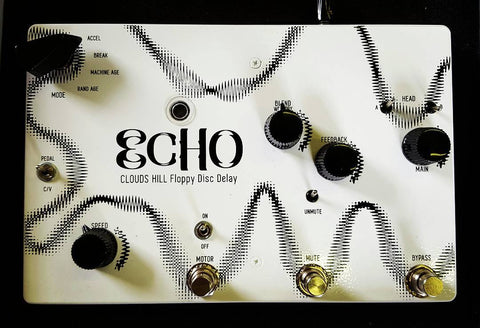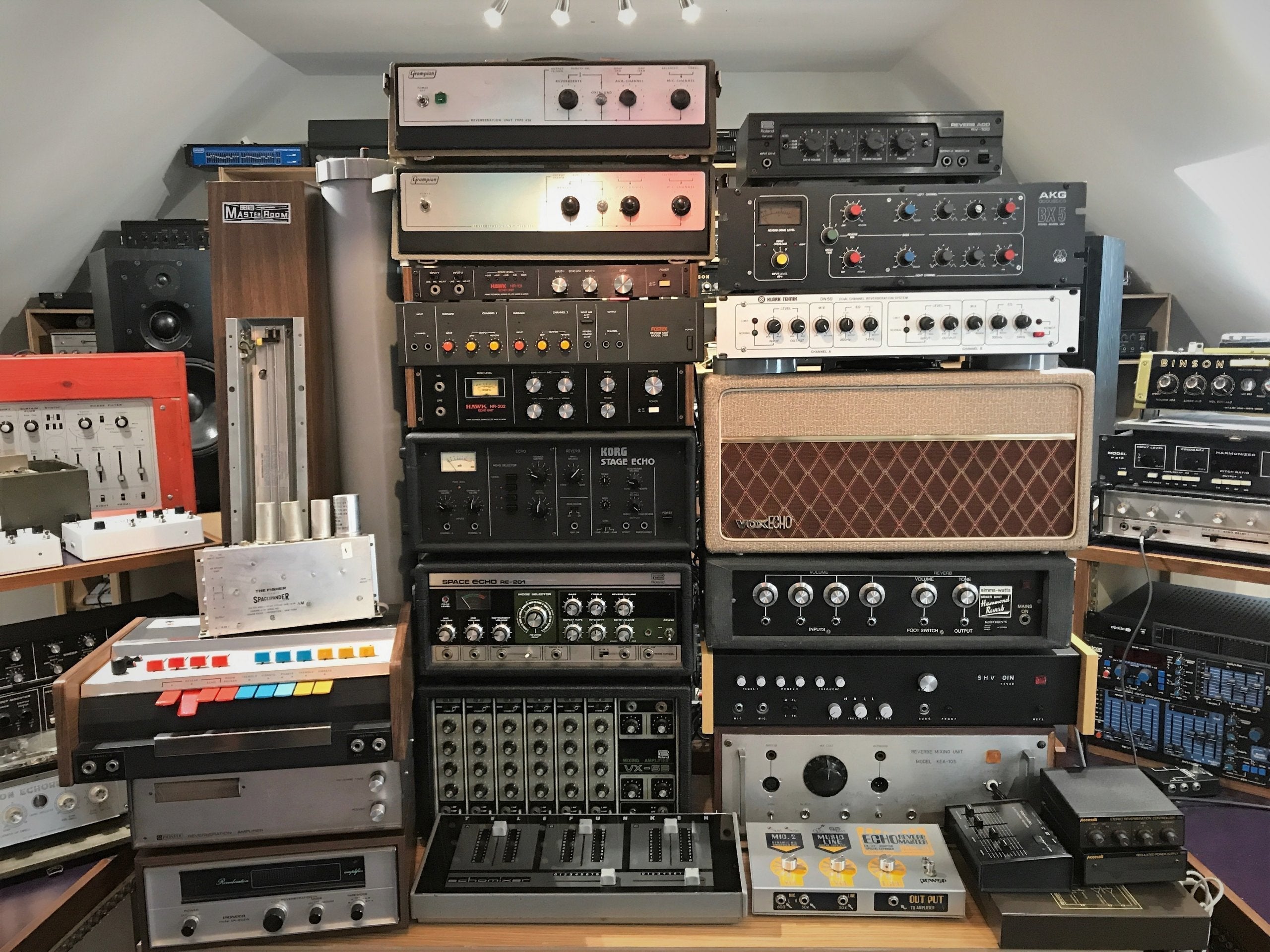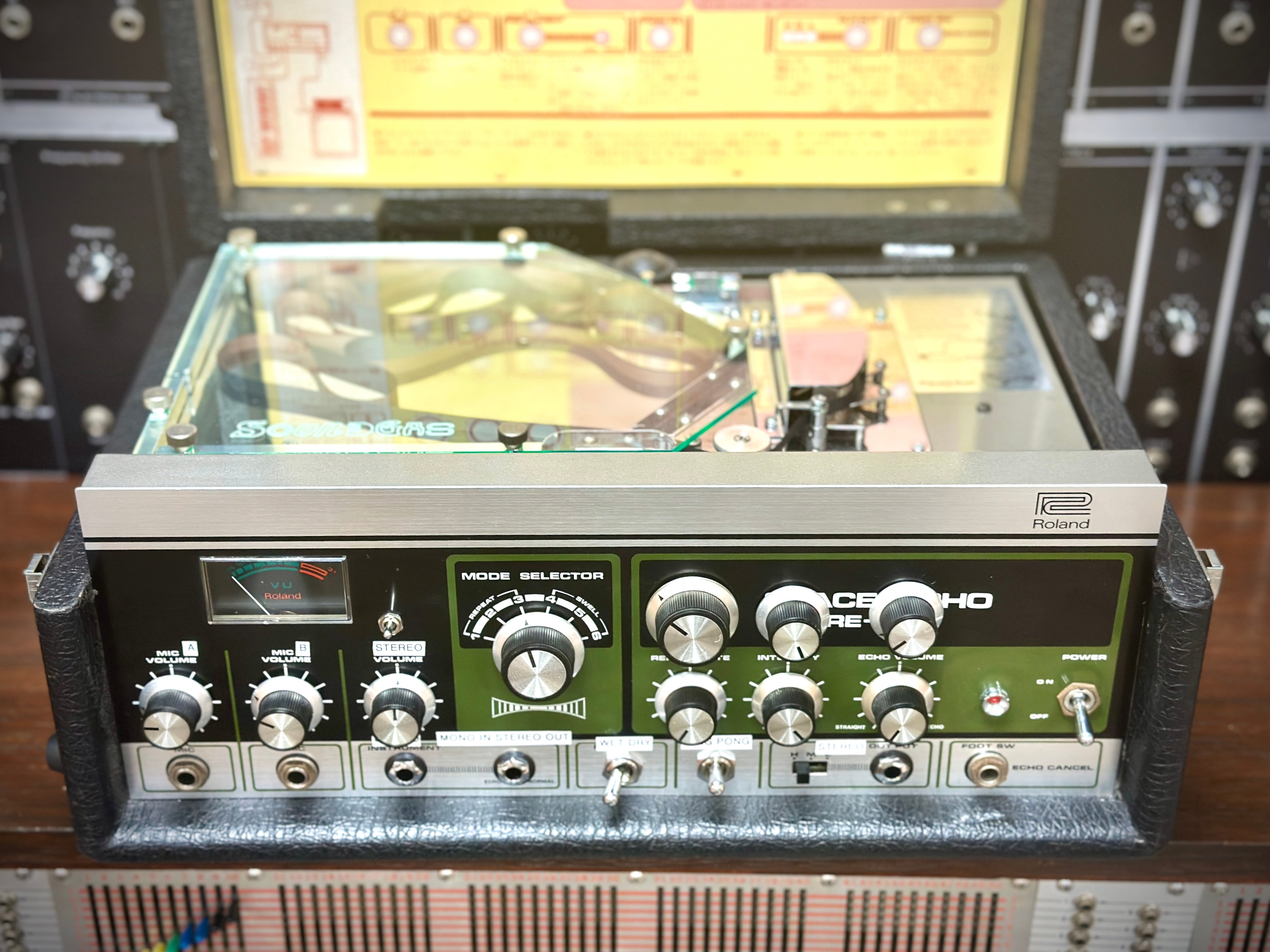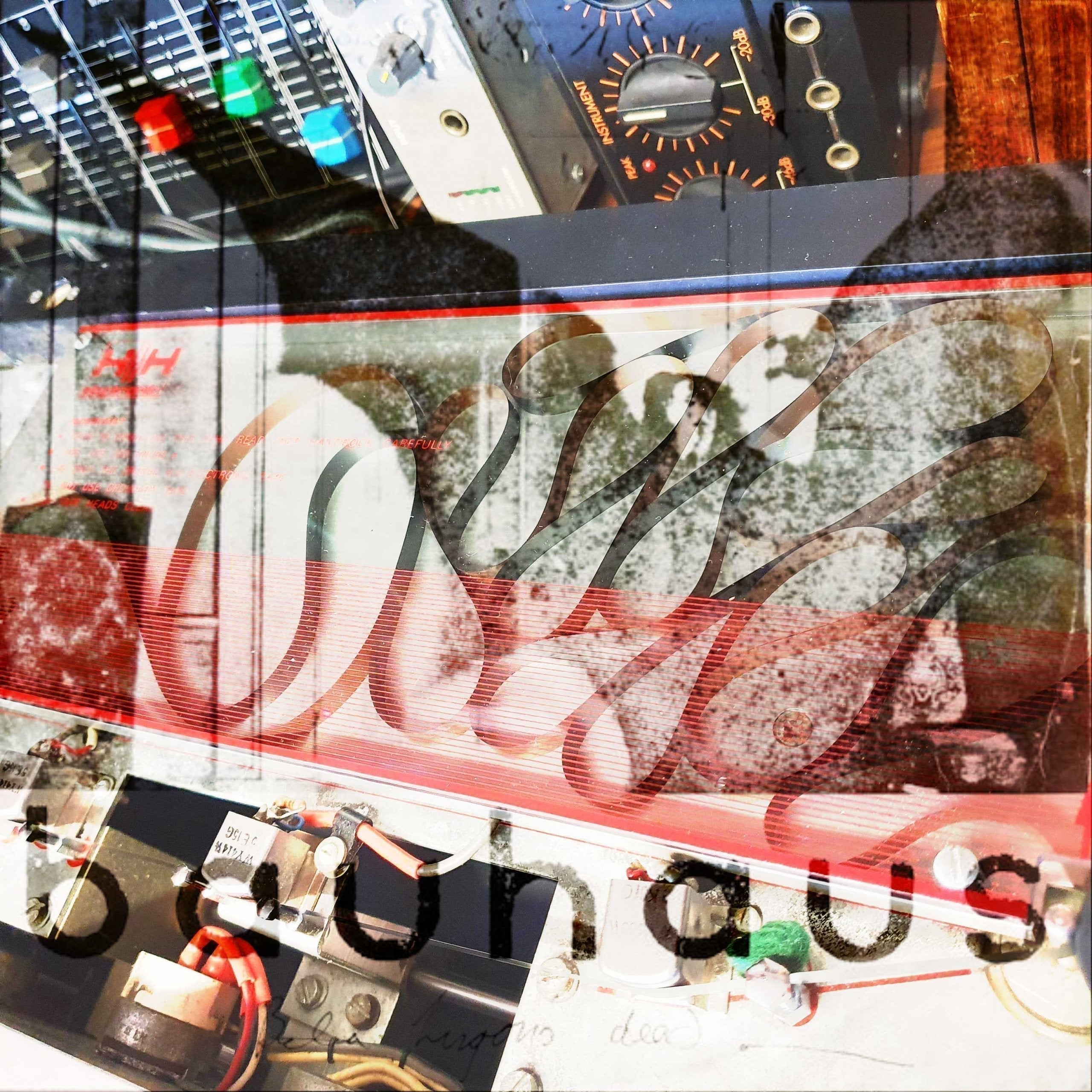You can see our ECHO in action the youtube demo below, as well as on several demos on our Instagram feed.
The Floppy Disc Delay is the result of a collaboration between
Clouds Hill FX and instrument designer/builder Nicolas Baginsky of
NB-Instrument in Germany (who has spent two years working to perfect the design).
When I heard that there was a new analogue delay based on a floppy disc drive, I was immediately intrigued. Checking the spec and watching
the demos confirmed us to be kindred echo spirits. This is not just another 'me-too' analogue vintage-inspired effect: it's born of a genuine desire to create a high quality product offering the echo-fetishist something truly unique and creative.
Unlike the spinning metal drum-based Binson disc echoes that we at Soundgas love so much, the FDD was inspired by the seldom-seen disc echoes of the late 70s that used a flat disc with a ferrous oxide coating (Melos, Univox, Schaller, Echollette). I've owned an Echolette for many years and have found the different echo timbre compared to tape and drum machines very refreshing and inspiring. As a result we've always kept an eye out for these disc echoes - most recently we sold a
near mint Melos EM-200, which was a cracker - I really didn't want to part with it (
how unusual - Ed).
I contacted Clouds Hill in Germany and they kindly sent me a machine for evaluation which was one of the first ten 'double digit' (referring to the serial number) machines. These units have been painstakingly hand-tooled with bespoke machined parts and are a delight to behold: yet another testament to German design and engineering skill. The quality of construction and finish are superb; the pedal has an unexpected heft as you lift it from its crisp white printed box. The paintwork is a classy vintage off-white and all knobs/switches are solid and of a quality that puts many boutique products to shame.

Getting Floppy With It
In use, it swiftly becomes apparent that this is a machine to delight even the most world-weary echoist. My first immediate delight was the Motor On/Off momentary footswitch which, depending on the status of the toggle switch above it, starts or stops the disc transport. This yields all manner of whoops, gloops, bubbles and warbles - sonic manna that thus far has not failed to raise a smile in those who encounter it.
Two replay head switches, speed, feedback, wet/dry blend, input/output gain, mute/unmute and bypass controls are pretty much self-explanatory and no reading of the manual is required to get started. In fact, that was it for me for my first session with the FDD. I'd intended to have a quick play after dinner - get a feel for it before heading back out of the man cave to relax after a long day at the Soundgas coalface. This was not to be and, lost in the joy of this new sonic discovery, I burned much midnight oil with guitar in hand. The delight I found in a motor speed control that goes all the way down to stop took me back to my early studio days when I used to wrangle as many sonic artefacts as possible from a cranky solid state Copicat by manually slowing or stopping the capstan as it repeated or self-oscillated.
The FDD's speed control and motor start/stop footswitch are utterly-addictive and if - like me - you love warping and manipulating analogue echoes this machine will completely seduce you. I eventually crawled into bed in the early hours tired and mostly satisfied. I had some reservation about the delay level output being a little lower than I might always wish and consequently the self-oscillation wasn't always as overpowering as I'd like. I raised these points with Clouds Hill the next day, and they informed me that they were working on improvements for the full production units.
I'd not been able to locate my expression pedal so hadn't tried the switch that selected one of the four control modes: Acceleration, Brake, Machine Age and Random Age. This revelation was to be the following night's source of insomnia: what I'd enjoyed the previous evening turned out to be less than half of the sonic joy that this box offers the intrepid sound-wrangler when armed (legged?) with a suitable expression pedal.
Express Yourself
I also hooked up the second (Dry) output, which switches the main output to a wet-only signal and thus scotched my concerns about echo level: I could now boost the wet only output as much as I liked. I'm not going to write too much about the expression pedal options as you really need to see a demo, but be warned: view at your peril (unless your credit card is buff and ready to flex) as I suspect this will be the moment when you know you have to have one.
Simply-put, Acceleration and Brake use the expression pedal as a car's gas/brake pedal, speeding up or slowing down the disc's rotation and hence the echoes - all the way to or from stop if required. Machine Age increases the error-rate from a well-maintained machine all the way to something that would best be described as 'for parts or not working'. Random age increases the frequency of random errors. These are of course just words, and being a worldly sonic adventurer, you have doubtless grasped the concepts described in this paragraph. Words, concepts - abstract, dry - and utterly inadequate to describe what happens when you use the FDD's extra settings via expression pedal or C/V Gate.
I'll say no more, other than I spent another unexpectedly-long and late night marvelling at the sonic possibilities of the FDD when paired with an expression pedal, and I slept soundly in the knowledge that there's a workaround if you find the echo levels insufficient at times. I also decided that I wasn't parting with the demo unit, which means there are only two remaining double digit FDDs left available for general sale before the full production run commences. And I haven't even yet explored the C/V Gate controls - C/V control for the expression pedal options and Gate for the motor on/off switch.
Don't... Delay
It's by no means an impulse buy for most mortals, but with this machine you do truly get what you pay for. The
hand-tooled double digit version for me is worth the extra price of admission - I love beautifully-engineered and lovingly-crafted gear and the very limited edition has definite appeal.
The build quality means that this is a machine that will echo well into the future, and the recording medium is widely-available (no more searching for someone with good tape stock to make fault-free loops) - there's a
YouTube demo showing how to extract a floppy disk from it's plastic case to use as a replacement for the FDD.
The Floppy Disc Delay could well find its hallowed place among the classic echo machines and I expect we'll have no trouble selling all 30 units that Clouds Hill say they intend to build. Sonically-unique, creatively-inspiring, beautifully-made, a joy to behold and play, and a limited production run to boot: this Echo is a bona fide future classic so don't delay (pun intended) -
order one today or miss out on the most fun you ever had with a floppy disc.
==========
Tony Miln is the co-founder (& Head Gear Head) of Soundgas. See/hear him in action on Instagram.










